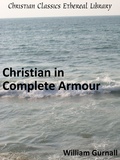William Gurnall
English author and clergyman
Biography
William was born at King's Lynn, Norfolk, was educated at the free grammar school of his native town, and in 1631 was nominated to the Lynn scholarship in Emmanuel College, Cambridge, where he graduated BA in 1635 and MA in 1639. He was made rector of Lavenham in Suffolk in 1644; and before he received that appointment he seems to have officiated, perhaps as curate, at Sudbury.
At the Restoration he signed the declaration required by the Act of Uniformity 1662, and on this account he was the subject of a libellous attack, published in 1665, entitled Covenant-Renouncers Desperate Apostates.
Gurnall is known by his Christian in Complete Armour, published in three volumes, dated 1655, 1658 and 1662. It consists of sermons or lectures delivered by the author in the course of his regular ministry, in a consecutive course on Ephesians 6: 10-20. The fact that a sixth edition was published in the year the author died, 1679, is enough to show that its merits were early recognized. It is described as a magazine whence the Christian is furnished with spiritual arms for the battle, helped on with his armor, and taught the use of his weapon; together with the happy issue of the whole war. It is thus considered a classic on spiritual warfare. The work is more practical than theological; and its quaint fancy, graphic and pointed style, and its fervent religious tone render it still popular with some readers.
Richard Baxter and John Flavel both thought most highly of the book. Toplady used to make copious extracts from it in his common-place book. John Newton, the converted slave trader, said that if he was confined to one book beside the Bible, he dared say Gurnall's Christian Armour would be his choice. Cecil spent many of the last days of his life in reading it, and repeatedly expressed his admiration of it. Charles Haddon Spurgeon commented that Gurnall's work is "peerless and priceless; every line full of wisdom. The book has been preached over scores of times and is, in our judgment, the best thought-breeder in all our library."
